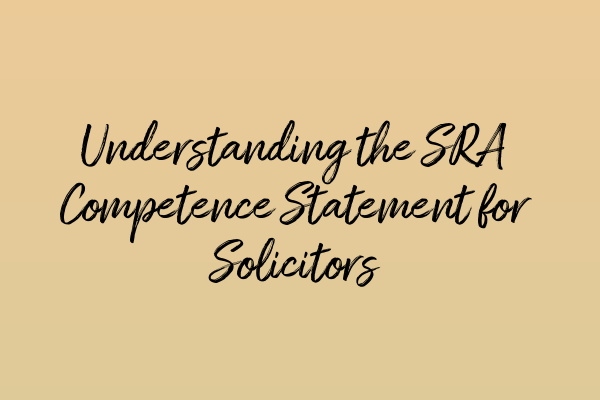Understanding the SRA Competence Statement for Solicitors
As a solicitor, it is essential to stay updated with the latest regulatory requirements and guidelines set by the Solicitors Regulation Authority (SRA). One crucial aspect of being a competent solicitor is understanding and adhering to the SRA Competence Statement. In this article, we will explore what the Competence Statement entails and why it is vital for solicitors to familiarize themselves with it.
The SRA Competence Statement outlines the skills, knowledge, and behaviors that solicitors must possess in order to provide competent legal services. It serves as a benchmark for solicitors to assess and develop their professional competence. By adhering to the Competence Statement, solicitors can ensure that they are meeting the expected standards set by the SRA.
The Competence Statement is divided into three parts: the Statement of Solicitor Competence, the Threshold Standard, and the Continuing Competence. Let’s delve into each of these components to gain a deeper understanding.
1. Statement of Solicitor Competence:
The Statement of Solicitor Competence outlines the core knowledge and skills that solicitors should possess in order to perform their duties effectively. It covers six areas:
a. Ethics, professionalism, and judgment
b. Technical legal practice
c. Working with others
d. Managing themselves and their own work
e. Business and financial awareness
f. Advices, advocacy, and drafting
By focusing on these areas, solicitors can ensure that they have a well-rounded skill set and are equipped to handle various legal challenges.
2. Threshold Standard:
The Threshold Standard establishes the minimum requirements that solicitors must meet in order to become qualified. It sets the baseline for entry into the legal profession and ensures that solicitors have a solid foundation to build upon.
The Threshold Standard covers areas such as legal knowledge and understanding, ethical standards and professionalism, client service, technical legal practice skills, and communication and literacy skills. By meeting these requirements, solicitors can demonstrate their ability to provide competent legal services to their clients.
3. Continuing Competence:
The concept of continuing competence emphasizes the need for solicitors to continuously develop their skills, knowledge, and behaviors throughout their career. It encourages solicitors to engage in ongoing learning and professional development activities to stay up-to-date with changes in the legal profession.
Solicitors are expected to reflect on their practice, identify areas for improvement, and take proactive steps to enhance their competence. This can involve attending training programs, participating in professional networks, and staying informed about legal developments.
The SRA Competence Statement is not a static document. It evolves with the changing legal landscape to ensure that solicitors are equipped to meet the needs of their clients and the profession as a whole. As such, it is essential for solicitors to stay informed about any updates or revisions to the Competence Statement.
In conclusion, understanding and adhering to the SRA Competence Statement is crucial for solicitors to provide competent legal services. By familiarizing themselves with the Statement of Solicitor Competence, the Threshold Standard, and the concept of continuing competence, solicitors can ensure that they are meeting the expected standards and continuously developing their professional skills. Stay updated with the latest regulatory requirements set by the SRA and strive for excellence in your legal practice.
Related Articles:
– Private Prosecutions: Exploring Non-Governmental Prosecutions in Criminal Cases
– Ethical Challenges in Criminal Defence: Navigating Dilemmas
– Understanding Drug-related Offences: Laws and Penalties in the UK
– Magistrates’ Court vs Crown Court: Different Paths in Criminal Proceedings
– Criminal Defence Strategies: Expert Approaches to Protecting Clients’ Interests


Leave a Reply